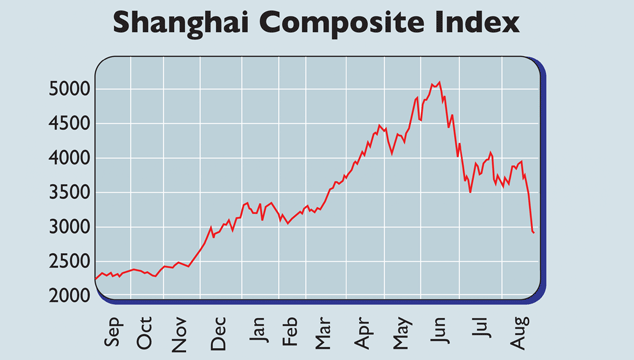August angst rattles stocks
Global stockmarkets remained volatile after Black Monday, which saw some of the nastiest daily falls since the global financial crisis.

Get the latest financial news, insights and expert analysis from our award-winning MoneyWeek team, to help you understand what really matters when it comes to your finances.
You are now subscribed
Your newsletter sign-up was successful
Want to add more newsletters?

Twice daily
MoneyWeek
Get the latest financial news, insights and expert analysis from our award-winning MoneyWeek team, to help you understand what really matters when it comes to your finances.

Four times a week
Look After My Bills
Sign up to our free money-saving newsletter, filled with the latest news and expert advice to help you find the best tips and deals for managing your bills. Start saving today!

Global stockmarkets remained volatile after Black Monday, which saw some of the nastiest daily falls since the global financial crisis. On Tuesday, China's central bank, the People's Bank of China, tried to cheer investors by adding liquidity to the system. It cut interest rates for the fifth time in nine months and further reduced the Reserve Requirement Ratio (RRR), the amount of cash banks must set aside rather than lend out. But the move failed to halt another decline on Wednesday, when the Shanghai Composite Index fell by 1.3%. That sealed the worst five-day fall since 1996, and unsettled European markets again.
The turmoil has prompted many investors to put back their expectations of a US interest rate hike. Barclays, for instance, now reckons the first hike in almost a decade will come in March 2016, not next month. Ray Dalio, head of Bridgewater, a $200bn hedge fund group, said the US Federal Reserve would now ease monetary policy, restarting quantitative easing (QE), or money-printing, instead of tightening.
What the commentators said
Far less encouraging, however, is the apparent return of the "Greenspan put" to the US, said James Saft on Reuters: the belief, nurtured by 1990s Fed chairman Alan Greenspan, that the central bank will always bail out markets by ensuring they have plenty of liquidity. Everyone is now saying they expect rates to stay on hold or even be cut, even though the economy looks healthy enough to cope.
MoneyWeek
Subscribe to MoneyWeek today and get your first six magazine issues absolutely FREE

Sign up to Money Morning
Don't miss the latest investment and personal finances news, market analysis, plus money-saving tips with our free twice-daily newsletter
Don't miss the latest investment and personal finances news, market analysis, plus money-saving tips with our free twice-daily newsletter
This constant mollycoddling of investors encourages risk-taking and the formation of bubbles, continued Saft. "Silly people do silly things with money because they believe the Fed has their back." Putting off the downswing in a cycle risks a bigger collapse later. What's more, stocks are already historically overpriced, which means their long-term returns from these levels will be lousy. It's time the Fed allowed investors to grow up and make their own mistakes.
Get the latest financial news, insights and expert analysis from our award-winning MoneyWeek team, to help you understand what really matters when it comes to your finances.

-
 Should you buy an active ETF?
Should you buy an active ETF?ETFs are often mischaracterised as passive products, but they can be a convenient way to add active management to your portfolio
-
 Power up your pension before 5 April – easy ways to save before the tax year end
Power up your pension before 5 April – easy ways to save before the tax year endWith the end of the tax year looming, pension savers currently have a window to review and maximise what’s going into their retirement funds – we look at how